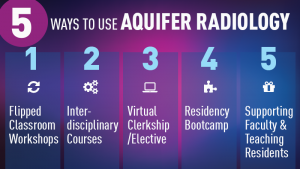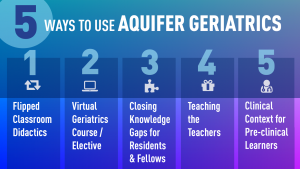Educator-to-Educator Tips & Strategies
Find out how your peers are making the most of Aquifer cases and teaching tools.
Find out how your peers are making the most of Aquifer cases and teaching tools.

Touro University California Physician Assistant Program has been utilizing Aquifer cases since 2019. Originally, the cases were assigned to clinical year students to fill knowledge gaps and remediate rotations. Clinical year students found reviewing concepts in Aquifer cases during the virtual rotation block very valuable and found that cases improved in-person patient encounters.

At Florida Atlantic University Charles E. Schmidt College of Medicine, we are supporting our fourth-year students with flexible online elective rotations by adapting the model we created during COVID. Our virtual asynchronous electives–built with Aquifer cases and WISE-MD modules and implemented on the fly during lockdown–proved valuable to students, earning positive feedback and course reviews. With a few minor modifications, we are continuing this offering in response to student requests and the wide range of time-consuming requirements in the fourth year.

Whether you’re searching for ways to engage students in virtual learning, revamping a stale lecture, or building a new didactic session, flipping the classroom around Aquifer cases is a powerful way to engage your students and help case-based learning stick. Check out different ways that medical educators are integrating Aquifer cases into their pedagogy…

The 19 cases in Aquifer Radiology are designed to meet the needs of a wide range of learners and fit into many teaching modalities. Top radiology educators presented their successful strategies for integrating the cases in our recent webinar–find out what they shared…

The 27 cases in Aquifer Geriatrics are designed to meet the needs of a wide range of learners and fit into many teaching modalities. Top geriatrics educators from around the country presented their successful strategies for integrating the cases in our recent webinar–find out what they shared…

Medical schools have always worked hard to provide fourth-year students with clinical knowledge. But far less time is dedicated to effective, delicately nuanced conversations about diagnoses and prognoses with patients and their families. This gap isn’t new, but it’s being exacerbated by the pandemic. In response, we created an online elective dedicated entirely to learning, thinking about, and practicing these difficult communication skills.

Like everyone else, our school needed to develop alternatives for our new fourth-year students due to the COVID-19 pandemic. With an uncertain return date for students at a range of clinical sites, we decided to build virtual, asynchronous electives that would help prepare students for their clinical rotations, and especially their Acting Internships. We leveraged a range of case-based online modules to cover different disciplines, including Aquifer and WISE.

It may seem unusual to design and implement a medical student course focused on high-value care in the middle of a pandemic. As third and fourth-year medical students were pulled from clinical duties at the urging of the AAMC, educators at the University of Virginia School of Medicine developed a two-week online course. The course introduced students to an integrative, comprehensive model of high-value care applicable to future clinical practice.